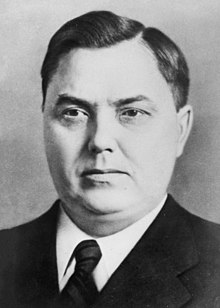Malenkov
| Georgy Malenkov Гео́ргий Маленко́в |
|
|---|---|
 |
|
|
Chairman of the Council of Ministers |
|
|
In office 6 March 1953 – 8 February 1955 |
|
| First Deputies |
Vyacheslav Molotov Nikolai Bulganin Lavrentiy Beria Lazar Kaganovich |
| Preceded by | Joseph Stalin |
| Succeeded by | Nikolai Bulganin |
|
Deputy Chairman of the Council of Ministers |
|
|
In office 9 February 1955 – 29 June 1957 |
|
| Premier | Nikolai Bulganin |
|
In office 2 August 1946 – 5 March 1953 |
|
| Premier | Joseph Stalin |
|
In office 15 May 1944 – 15 March 1946 |
|
| Premier | Joseph Stalin |
| Full member of the 18th, 19th, 20th Presidium of the CPSU | |
|
In office 18 March 1946 – 27 February 1957 |
|
| Candidate member of the 18th Politburo of the CPSU | |
|
In office 21 February 1941 – 18 March 1946 |
|
| Member of the 18th, 19th Secretariat of the CPSU | |
|
In office 1 July 1946 – 14 March 1953 |
|
|
In office 22 March 1939 – 6 May 1946 |
|
| Member of the Orgburo of the CPSU | |
|
In office 22 March 1939 – 14 October 1952 |
|
| Personal details | |
| Born |
Georgy Maximilianovich Malenkov 8 January 1902 Orenburg, Russian Empire |
| Died | 14 January 1988 (aged 86) Moscow, Russian SFSR, Soviet Union |
| Nationality | Soviet |
| Political party | Communist Party of the Soviet Union |
| Spouse(s) | Valeriya A. Golubtsova (1901–1987) |
| Children | 3 |
| Alma mater | Moscow Highest Technical School |
| Profession | Engineer, politician |
|
|
Georgy Maximilianovich Malenkov (Russian: Гео́ргий Максимилиа́нович Маленко́в; 8 January 1902 [O.S. 26 December 1901] – 14 January 1988) was a Soviet politician and Communist Party leader.
His family connections with Vladimir Lenin sped his promotion in the party, and in 1925 he was put in charge of the party records. This brought him into close association with Joseph Stalin, and he was heavily involved in the purges of the 1930s. During World War II, he was given sole responsibility for the Soviet missile program. Later he gained favour with Stalin by discrediting Marshal Georgy Zhukov for supposed disloyalty, and supporting Stalin’s campaign to erase all the glories of Leningrad in the public mind, in order to promote Moscow as the cultural capital.
On Stalin’s death in 1953, Malenkov was briefly party leader, but was soon replaced by Nikita Khrushchev, with Malenkov as premier, as the party did not want both functions entrusted to the same person. His two-year term ended in failure. He was expelled from the Politburo in 1957. In 1961 he was expelled from the party and exiled to Kazakhstan.
Malenkov was born at Orenburg in the Russian Empire. His paternal ancestors were from the area of Ohrid, then in the Ottoman Vilayet of Manastir. Some of them served as officers in the Russian Imperial Army. His father was a wealthy farmer in Orenburg province. Young Malenkov occasionally helped his father to do business selling the harvest. His mother was the daughter of a blacksmith and the granddaughter of an Orthodox priest.
...
Wikipedia
